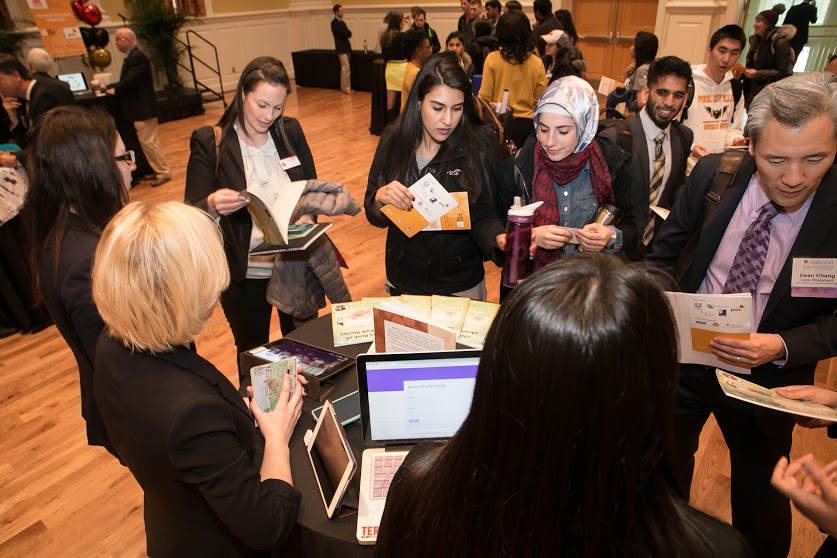By James Whitlow
For The Diamondback
A deluge of students poured into Stamp Student Union’s Grand Ballroom on Friday afternoon to learn that businesses and social impact are not mutually exclusive.
The crowd of students, faculty and professionals learned more about this concept as well as business practice tips at the eighth annual Social Enterprise Symposium, hosted by the business school’s Center for Social Value Creation. Unilever, Goodwill, Macy’s Inc., PricewaterhouseCoopers and Earth Color helped sponsor the event.
The symposium’s goal was to try to show that a middle ground exists between profitability and social impact, said Kimberlee Glinka, Center for Social Value Creation associate director.
“It’s important to shine a light on the people who are out there trying to do good in the world and make change using business as a tool,” Glinka said. “It’s not a dialogue that you get a lot of in media.”
About 450 students registered for the event this year, Glinka said.
The symposium featured two keynote speakers, small group discussions of business’s role in solving societal problems, a brief networking session and a competition in which student entrepreneurs showcased products and business strategies designed to benefit social causes and investors.
This year’s symposium was three hours shorter than those in previous years, Glinka said.
“It’s a little bit more of a fast and furious schedule,” she said. “Every year, we like to try something a little bit different to see what resonates best with our student community.”
Alex Counts, Grameen Foundation founder, spoke about his career in microfinance, and Jonathan Atwood, vice president of sustainable living and corporate communications for Unilever North America, bookended the symposium.
Atwood said Unilever — a British and Dutch company with more than 400 brands ranging from Dove soap to Ben & Jerry’s ice cream — sees social issues as opportunities to market its products and fix societal problems.
The company has partnered with organizations such as Direct Relief, UNICEF and the Wounded Warrior Project. Unilever couples products with nonprofits to better market them and spread awareness of social issues such as poverty, climate change and hygiene in the developing world, he said.
“Brands with a purpose grow faster,” he said. “Brands that campaign on social issues grow the fastest.”
Atwood said social entrepreneurship does not inhibit growth and that businesses can fix social problems while making a profit. Unilever saved $600 million by manufacturing its products sustainably, he said, and the company hopes to lead by example and motivate other businesses to prioritize social causes.
“We hope to transform business,” he said. “We want to be a driving force to rally business around some of these societal issues.”
Glinka said she hoped the symposium would push students to think about business as a tool for social change.
“The dialogue throughout the conference is thinking about how you use the tools of business … to make positive change in the world,” she said.
Senior journalism and marketing major Kathryn Klett said the symposium piqued her interest in how businesses can effect social change.
“It seems to be something that’s really up-and-coming,” she said. “I really wanted to just come out here and see, what is this?”
Klett, who plans to study public policy in graduate school , said the event connected her with knowledgeable activists and businesspeople who shed light on her intended field of study.
“The most important thing is the ability to come in and see what other people are doing and learn from it,” she said. “And in learning from that, you learn about yourself.”



